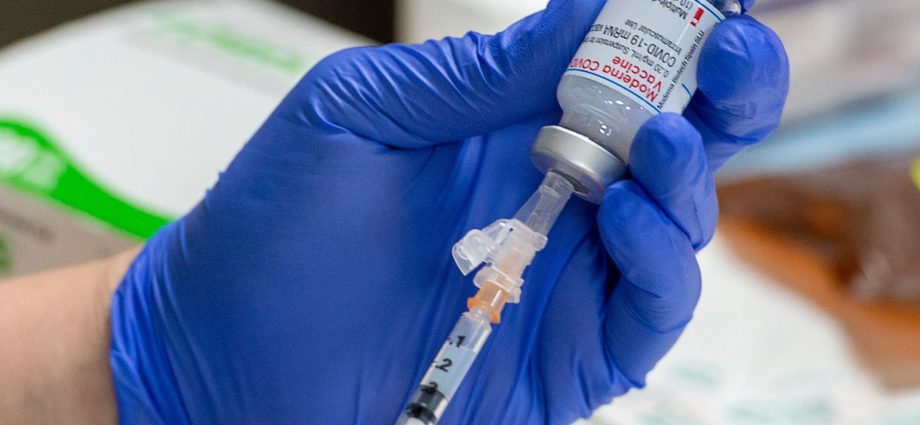Northern Ontario First Nations leaders are rolling up their sleeves first to battle COVID-19 vaccine hesitancy
Amanda Parsons, a registered nurse on staff at the Northwood Care facility, prepares a dose of the Moderna COVID-19 vaccine in Halifax on Jan. 11, 2021. Andrew Vaughan/ The Canadian Press
By Willow Fiddler, Local Journalism Initiative Reporter, The Globe and Mail
February 05, 2021
First Nations in Northern Ontario are enlisting trusted leaders to be among the first to get the Moderna COVID-19 vaccine as its being delivered to remote communities, some of which are experiencing low participation because of vaccine hesitancy.
Ontario NDP MPP Sol Mamakwa said he was invited by the leadership from Muskrat Dam to attend their first vaccination clinic earlier this week after low sign-up numbers.
Mr. Mamakwa, who represents the Kiiwetinoong riding, told The Globe and Mail that he was reluctant at first, worried about the optics after the outrage over a B.C. couple who chartered a plane to a remote community in the Yukon to get vaccinated.
“When I spoke to the chief about it, he said ‘yours is different, we have a letter for you that invites you,’ ” said Mr. Mamakwa, persuaded it was the right thing to do.
Chief Gordon Beardy of Muskrat Dam says it’s up to leadership to be role models when community members are in doubt. He said members hear “a lot of false information” that the vaccine isn’t safe.

Chief Beardy was also the first in his band council to get vaccinated, followed by other council members, elders and Mr. Mamakwa.
“For [Mr. Mamakwa] to be there as our member of parliament it shows solidarity with us,” Chief Beardy said in a phone interview.
Mr. Mamakwa, whose home community is Kingfisher Lake, is a former health director for Nishnawbe Aski Nation, an organization representing 49 First Nations in Northern Ontario. He’s become a trusted and respected leader in the region, familiar with the customs and ways of life in the north.
Mr. Mamakwa has received a second request to attend a vaccination clinic in another remote community in his constituency next week. As someone who’s already received his first dose, he will attend to show support.“
People will trust that and, you know, it’s part of our culture to take the lead,” he said.
Chief Beardy says an initial community survey indicated that about 66 per cent of adults would get vaccinated. The vaccination clinics in the region are headed by Ornge, an air ambulance and medical transportation service, in what is called Operation Remote Immunity. Within three days, Chief Beardy says they reached their target of vaccinating 85 per cent of 195 eligible community members.
Over the next couple of months, a total of 31 communities are set to receive both doses of the Moderna vaccine in an area that hasn’t seen the number of cases and outbreaks that communities in Northern Manitoba have experienced. In fact, Muskrat Dam hasn’t reported a single COVID-19 case and there have been only 46 cases reported in all 31 communities.
The Sioux Lookout First Nations Health Authority, which is providing COVID-19 public-health management for some of the 31 communities, says the goal is to vaccinate 80 per cent in each community to achieve herd immunity. Preliminary numbers show uptake has been as low as 17 per cent in one community.
However, a statement from the Kashechewan chief and council said that their vaccination efforts were successful and that 731 doses were administered over three days to 73 per cent of their adult population.
Mr. Mamakwa says that while he believes the small number of COVID-19 cases among First Nations in Northern Ontario has contributed to hesitancy, he notes that there’s a slew of misinformation and conspiracy theories. And that’s not all.
“We have to understand that [First Nations] have negative experiences in health care,” he said. He added adding that people face language and cultural barriers when they have to leave their communities to access health care, as well as dealing with historical traumas from experiences such as residential schools.
Chief Beardy said the vaccination teams were professional and receptive to their customs and ways of life. Upon arriving to the community, the vaccines and medical team administering them were given a blessing and prayer by local leaders and elders.
Ornge public-relations officer Joshua McNamara says that as of Feb. 3, their teams had administered a total of 2,228 doses in the region.
Subscribe to our newsletter.
Dr. Homer Tien, President and CEO of Ornge, previously told The Globe that approximately 16,000 doses had been allocated for Operation Remote Immunity.


